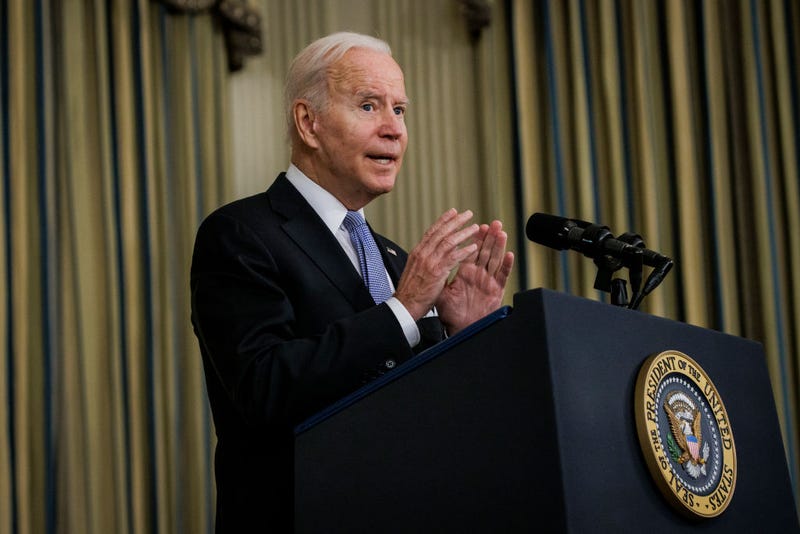
Lawmakers in the U.S. House of Representatives passed a $1.2 trillion infrastructure bill Friday night. While the price tag is massive, the bill has been cut down from its initial proposed $2.25 trillion budget.
Here’s what is still in it and what might be cut when it gets to the Senate.
According to CNN, the bill includes: funding for roads and bridges; transit and rail; broadband upgrades; airport, port and waterway upgrades; electric vehicle infrastructure; improvements to power and water systems and environmental remediation.
Funding for roads and bridges comes out to $110 billion, significantly less than the $159 billion that President Joe Biden initially requested in the American Jobs Plan. Included in this figure is $40 billion for bridge repair, replacement and rehabilitation, said the bill text.
This is the largest dedicated bridge investment since the construction of the interstate highway system, said the White House.
Transportation safety spending in the bill is set at $11 billion. This figure includes a program to help states and localities reduce crashes and fatalities. It also features a $1 billion to reconnect communities divided by highways and other infrastructure. These divisions have disproportionately impacted Black neighborhoods.
Another $39 billion is set aside to modernize public transit, according to the bill text, less than the $85 billion that Biden initially wanted to invest. In addition to $66 billion in passenger and freight rail investments, the funds are expected to pay for new zero-emission vehicles.
Another $12 billion is allocated for partnership grants related to intercity rail service, including high-speed rail.
If eventually passed, these measures would be the largest federal investment in public transit in history and in passenger rail since the creation of Amtrak 50 years ago.
Internet infrastructure is also a priority in the legislation, with $65 billion included for improving the nation's broadband infrastructure. Biden initially wanted to invest $100 billion, said CNN.
As for ports, many of which have seen supply chain backups in recent weeks due to COVID-19 pandemic-related issues, the bill includes plans to spend $17 billion to improve infrastructure. Airports are also expected to get a $25 billion boost to take care of repair and maintenance backlogs and to reduce congestion and emission.
Outside of the zero-emission spending included in the bill’s public transportation plans, $7.5 billion for zero-emission busses and ferries as well as $7.5 billion for a network of chargers for electric vehicles.
Power and water systems in general would also get help from the bill. A project to rebuild the electric grid for $65 billion is included in the legislation and $55 billion is included for upgrades to water infrastructure. These projects are bolstered by another $50 billion that would go toward protecting the system from drought, floods and cyberattacks, the White House said.
Another $21 billion is included for various environmental cleanup projects.
According to CNN, the bill’s projects could help boost the nation's infrastructure system, which earned a C- score from the American Society of Civil Engineers earlier this year.
Items slashed from the initial proposal include $400 billion to bolster caregiving for aging and disabled Americans, $100 billion for workforce development, an $18 billion proposal to modernize Veterans Affairs hospitals and corporate tax hikes proposed by Biden.
While Democrats have said the bill would be funded through measures that would not raise taxes, CNN reported that the Congressional Budget Office estimates the legislation will add $256 billion to the country’s deficit over the next decade.
It passed in the house with 228 votes in favor and 206 opposed. Though it is a Democrat-led bill, six members of the party voted against it and 13 Republicans voted in favor of it.
Democrat holdouts included progressive members of the party: Rep. Jamaal Bowman (N.Y.), Cori Bush (Mo.), Alexandria Ocasio-Cortez (N.Y.), Ilhan Omar (Minn.), Ayanna Pressley (Mass.), and Rashida Tlaib (Mich.).
Progressive Democrats tried to stall voting on the measure to force a vote on another large social welfare bill that had received pushback from moderate Democrats Sen. Joe Manchin of West Virginia and Sen. Kyrsten Sinema of Arizona.
LISTEN on the Audacy App
Sign Up and Follow Audacy
Facebook | Twitter | Instagram